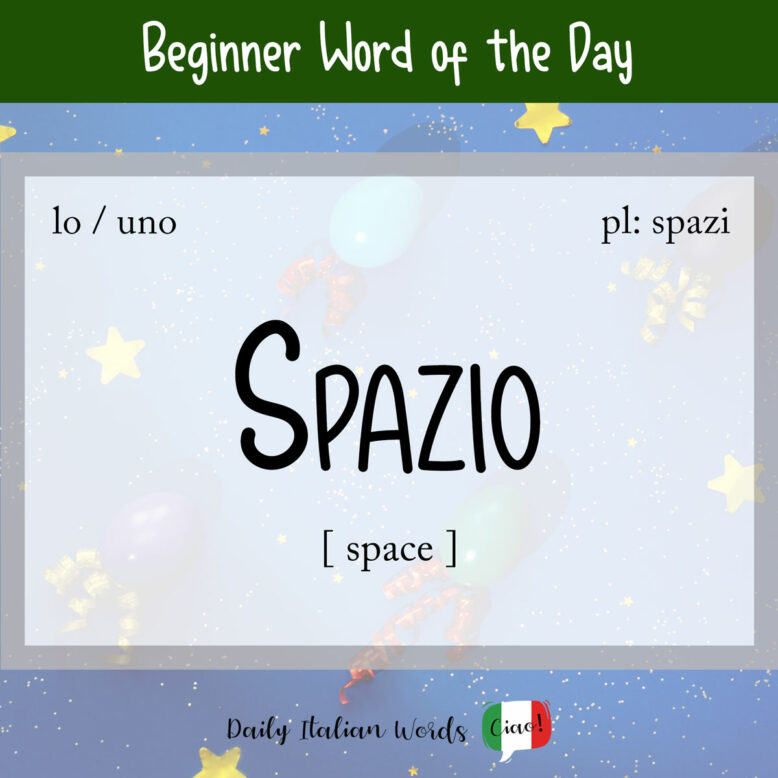The English word space carries various meanings, and the good news for learners is that the Italian equivalent, spazio, covers nearly all of these meanings as well.
spazio
space

Before we dive in, let’s quickly explore its etymology. Spazio derives from the Latin spatium, a word of uncertain origin that encompasses the same meanings as its Italian counterpart. It is a masculine noun that begins with sp-, so it takes the following definite and indefinite articles:
- lo spazio = the space
- uno spazio = a space
- gli spazi = the spaces
- degli spazi = some spaces
First, we have spazio in the sense of an expanse which is available and unoccupied. You might say, for example, that there is no space – non c’è spazio – for your luggage in the car, or that there is lots of space – tanto spazio – in the gym to exercise. In this sense of the word, we also use the synonym room in English.
Here are some common verbs you will see paired with spazio when this is the meaning:
- dare spazio a qualcuno = to give someone space
- fare spazio a qualcuno = to make space for someone
- lasciare spazio a qualcuno = to leave someone space
- ritagliarsi uno spazio = to find space for something / to find time for something
- trovare spazio = to find space / make way (through something)
Under this umbrella also falls two-, three-, and four-dimensional space, known as spazio bidimensionale, tridimensionale, and quadridimensionale, respectively.
Mi fai un po’ di spazio?
Could you make some room/space for me?

Just as in English, spazio also refers to a large area such as that within a city, for example. Spazio pubblico means public space, and green space translates to spazio verde, just to give you two examples.
Moving on, we have spazio in the sense of outer space, the vast expanse in which all objects exist and move. At this point, it’s also worth mentioning the adjective spaziale (space / spacial), as it is frequently used to describe objects and concepts associated with outer space such as:
- era spaziale = space age
- nave / navicella spaziale = spaceship
- stazione spaziale = space station
- tuta spaziale = spacesuit
- sonda spaziale = space probe
- viaggio spaziale = space flight
- esplorazione spaziale = space exploration
La navicella spaziale sta vagando per lo spazio.
The spaceship is flying through space.

Note: spaziale is also an adjective that can be used in colloquial conversation to describe something extraordinary or out of this world (e.g. una gara spaziale = a race out of this world).
Then there is the kind of spazio that refers to the distance between two objects, such as the spazio between two chairs or two written words on a page:
- Serve più spazio fra i due tavoli = we need more space between the two tables
- Dobbiamo dare più spazio allo sport nel prossimo numero = We need to give sport more space in the next edition
- Spazio pubblicitario = advertising space (in newspapers, magazines, TV shows etc.)
You can also use spazio to describe a length of time: dare spazio a programmi giovanili means to give youth’s programs more time (on a TV channel or the radio, for example).
When the meaning is period of time, it’s common to encounter the expression nello spazio di (in the space of).
Nello spazio di due settimane, il giovane attore è passato dalle stelle alle stalle.
In the space of two weeks, the young actor went from riches to rags.
There are a few meanings for spazio that don’t directly match the English space. For instance, it’s used to denote a blank area left for a signature on a document, as well as figuratively to describe an opportunity or possibility.
L’azienda non offre molto spazio per crescere.
The company doesn’t offer a lot of possibility to grow.
Heather Broster is a graduate with honours in linguistics from the University of Western Ontario. She is an aspiring polyglot, proficient in English and Italian, as well as Japanese, Welsh, and French to varying degrees of fluency. Originally from Toronto, Heather has resided in various countries, notably Italy for a period of six years. Her primary focus lies in the fields of language acquisition, education, and bilingual instruction.


